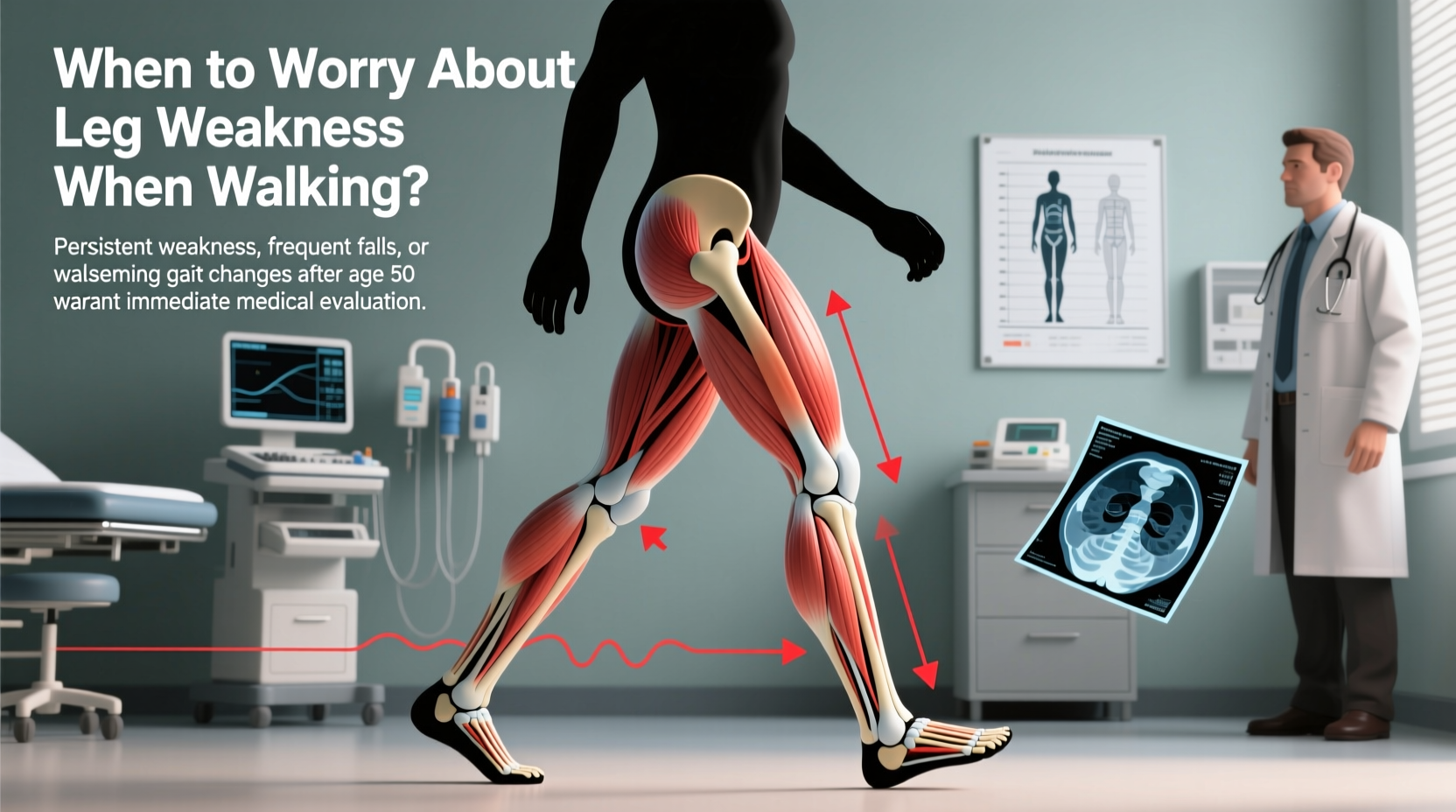Experiencing leg weakness while walking can be unsettling, especially if it appears suddenly or worsens over time. While occasional fatigue or muscle strain is normal, persistent or progressive leg weakness may signal an underlying health issue. Understanding the potential causes, recognizing red flags, and knowing when to seek medical evaluation are crucial for timely intervention and better outcomes.
Common Causes of Leg Weakness When Walking

Leg weakness during ambulation stems from a variety of physiological and neurological factors. These range from musculoskeletal conditions to nerve-related disorders and systemic diseases. Identifying the root cause often requires a detailed history, physical examination, and sometimes imaging or lab tests.
- Lumbar spinal stenosis: Narrowing of the spinal canal in the lower back can compress nerves leading to the legs, causing pain, numbness, and weakness—especially during prolonged walking.
- Peripheral neuropathy: Often linked to diabetes, this condition damages peripheral nerves, leading to tingling, burning sensations, and muscle weakness, particularly in the feet and lower legs.
- Herniated disc: A bulging or ruptured disc in the lumbar spine can press on spinal nerves, resulting in radiating leg weakness, often accompanied by sciatica.
- Multiple sclerosis (MS): An autoimmune disorder affecting the central nervous system, MS can disrupt nerve signals to muscles, causing intermittent or progressive leg weakness.
- Stroke or transient ischemic attack (TIA): Sudden leg weakness, especially on one side, may indicate a cerebrovascular event requiring immediate attention.
- Muscle atrophy or disuse: Prolonged immobility due to injury or illness can lead to deconditioning and perceived weakness.
- Vitamin deficiencies: Low levels of B12 or vitamin D can impair nerve function and muscle strength.
When to Seek Medical Diagnosis
Not all leg weakness demands urgent care, but certain patterns should prompt a visit to a healthcare provider. Early diagnosis improves treatment efficacy, especially for neurological or vascular conditions.
Consider scheduling an appointment if you experience:
- Gradual worsening of leg strength over days or weeks
- Difficulty climbing stairs or rising from a seated position
- Unexplained tripping or foot drop (inability to lift the front part of the foot)
- Weakness accompanied by back pain, numbness, or bladder/bowel changes
- Symptoms that interfere with daily activities or balance
“Persistent leg weakness isn’t something to ‘push through.’ It’s the body’s way of signaling a possible neurological or structural problem.” — Dr. Alan Reyes, Neurologist, Mayo Clinic
Red Flags: When to Worry and Seek Immediate Care
Some symptoms indicate potentially serious conditions that require emergency evaluation. Delaying care in these cases can lead to permanent damage.
| Symptom | Potential Condition | Action Required |
|---|---|---|
| Sudden leg weakness on one side | Stroke or TIA | Call emergency services immediately |
| Loss of bowel or bladder control with leg weakness | Cauda equina syndrome | Emergency surgery may be needed |
| Severe back pain with inability to walk | Spinal cord compression | Urgent MRI and neurosurgical consult |
| Rapidly progressing weakness over hours | Guillain-Barré syndrome | Hospitalization for IV immunoglobulin therapy |
Mini Case Study: Recognizing Cauda Equina Early
Sarah, a 52-year-old office worker, began noticing mild leg heaviness after long walks. Over two weeks, she developed numbness around her inner thighs and difficulty urinating. She dismissed it as stress until she woke up unable to fully empty her bladder. Rushed to the ER, an MRI revealed a large herniated disc compressing the cauda equina nerves. Immediate surgery prevented permanent paralysis. Her recovery was full, but delayed diagnosis could have led to lifelong disability.
This case underscores the importance of not ignoring subtle neurological symptoms—even if they start mildly.
Diagnostic Process: What to Expect
If you consult a physician for leg weakness, expect a systematic approach to rule out life-threatening and treatable conditions.
- Medical history review: Your doctor will ask about onset, progression, associated symptoms, past injuries, chronic illnesses (like diabetes), and medications.
- Neurological examination: Tests of reflexes, muscle strength, coordination, and sensation help localize the problem—whether it’s in the brain, spine, nerves, or muscles.
- Imaging studies: MRI of the lumbar spine is often used to detect herniated discs, stenosis, or tumors. Brain MRI may be ordered if stroke or MS is suspected.
- Nerve conduction studies (NCS) and EMG: These assess how well nerves and muscles communicate, useful in diagnosing neuropathy or radiculopathy.
- Blood tests: To check for diabetes, inflammation, vitamin deficiencies, or autoimmune markers.
Prevention and Management Tips
While not all causes of leg weakness are preventable, proactive measures can reduce risk and support overall neuromuscular health.
- Maintain good posture and use proper lifting techniques to protect your spine.
- Manage chronic conditions such as diabetes and high blood pressure.
- Ensure adequate intake of vitamins B12, D, and E through diet or supplements if deficient.
- Avoid prolonged sitting—take breaks to stretch and move every 30–60 minutes.
- Wear supportive footwear, especially if you walk long distances.
Checklist: When to Talk to Your Doctor About Leg Weakness
- ✔ Weakness persists beyond a few days without improvement
- ✔ You notice numbness, tingling, or loss of sensation in legs or feet
- ✔ Symptoms affect balance or increase fall risk
- ✔ There’s a history of back problems, cancer, or neurological disease
- ✔ You experience new urinary or bowel dysfunction
- ✔ Weakness begins suddenly or spreads rapidly
Frequently Asked Questions
Can dehydration cause leg weakness?
Yes, severe dehydration can lead to electrolyte imbalances (such as low potassium or sodium), which may temporarily impair muscle function and cause weakness or cramping. However, this type of weakness usually resolves with rehydration and does not persist during walking unless there's an underlying condition.
Is leg weakness a sign of Parkinson’s disease?
Not typically as an isolated symptom. Parkinson’s primarily affects movement initiation, causing tremors, rigidity, and shuffling gait. While patients may report leg “heaviness,” true muscle weakness is less common. If leg weakness dominates, other diagnoses like spinal or nerve disorders should be considered first.
Can anxiety cause leg weakness when walking?
Anxiety can produce physical sensations like trembling, dizziness, or a feeling of “jelly legs,” but it doesn’t cause true neuromuscular weakness. However, hyperventilation during panic attacks may alter blood pH and lead to temporary muscle fatigue. Persistent objective weakness requires medical investigation regardless of psychological factors.
Conclusion: Take Action Before It’s Too Late
Leg weakness when walking should never be ignored—especially when it’s new, progressive, or paired with other neurological symptoms. While some causes are benign and reversible, others demand swift medical attention to prevent irreversible damage. Whether it’s managing a chronic condition, adjusting lifestyle habits, or seeking emergency care, early action makes all the difference. Listen to your body, document your symptoms, and advocate for your health. Your mobility and quality of life depend on it.









 浙公网安备
33010002000092号
浙公网安备
33010002000092号 浙B2-20120091-4
浙B2-20120091-4
Comments
No comments yet. Why don't you start the discussion?